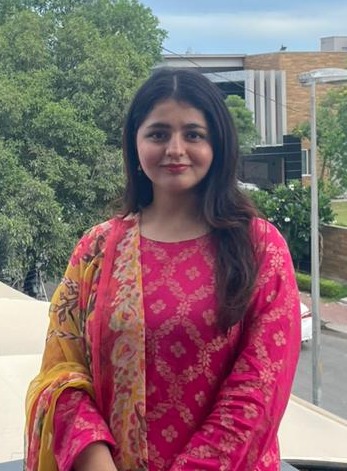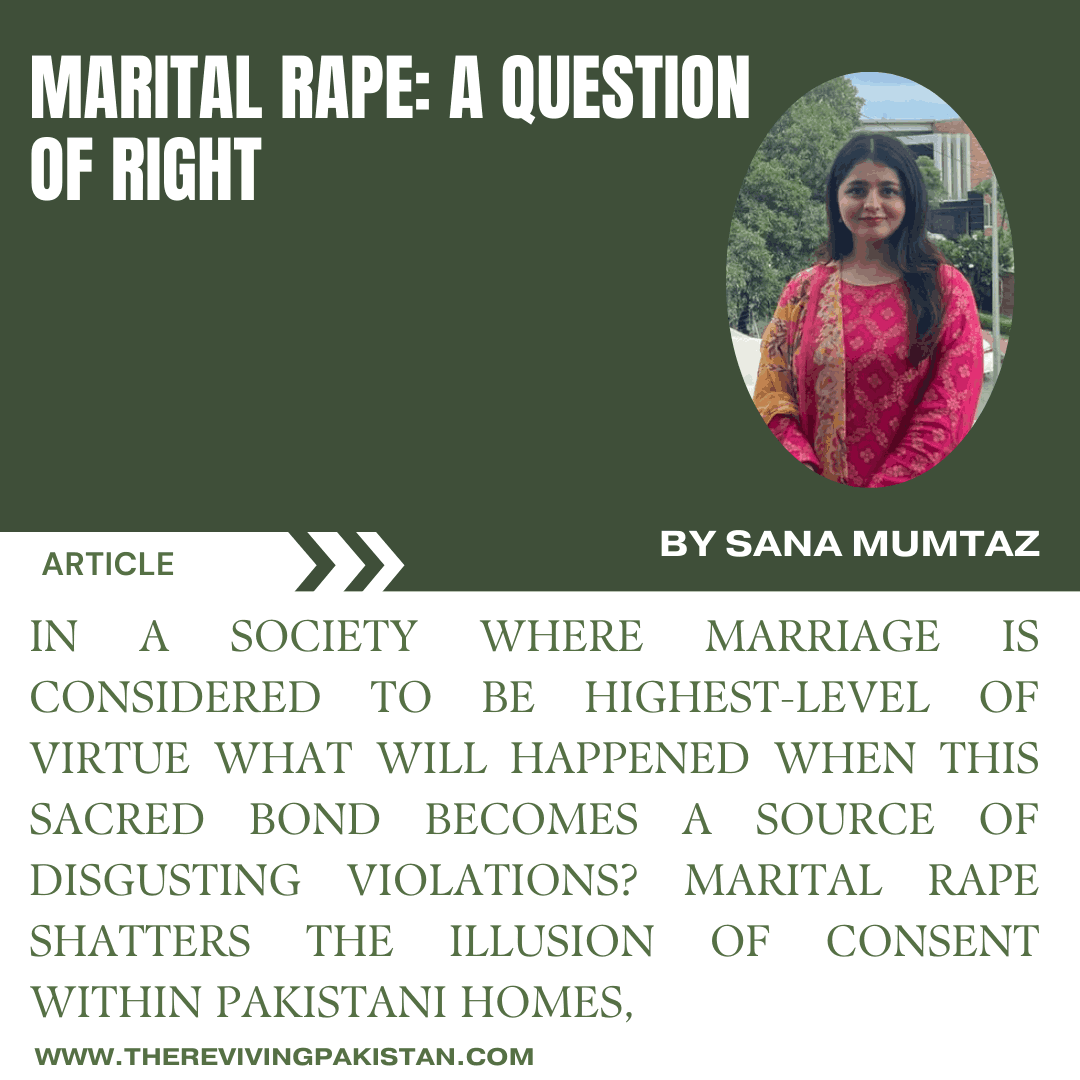About the Author(s)

Sana Mumtaz
The author is a student of international relations at the University of Central Punjab. She is a strong advocate for women and minority rights and wants to work towards a positive image of Pakistan.
In a society where marriage is considered to be the highest-level of virtue, what will happen when this sacred bond becomes a source of disgusting violations? Marital rape shatters the illusion of consent within Pakistani homes, it is challenging deeply ingrained cultural and religious norms.
What is marital rape? A question that is vexing the minds of Pakistani youth. To understand marital rape, one must understand what is rape?
The literal definition of rape is “any sexual activity, with or without penetration, that takes place without the consent of one of the people involved.”
If one focuses on the definition you would not find any mention of any sort of relationship between the abuser and the abused. So, one comes to the conclusion that if there is no consent it will be considered rape regardless of the relationship. Marital rape is when the abuser or rapist is in a marital contract with another person. Any use of force or threat by the partner to gain sexual advantage is a form of marital rape.
Is marital rape real?
Yes, marital rape exists and is reported throughout the world. But in Pakistan reporting rape or any form of sexual assault is considered shameful. How can anyone in society know that so-called “izzat” of the family has deteriorated.
Many Pakistani women are subjected to honour killing because they have ruined the family name by becoming victims of a tragedy. In the same society marital rape was unheard of. How can your spouse force you? Most Pakistani women believe that it is a wifely duty to allow sexual advantages even if their will is not present. Marital rape is not reported because it simply doesn’t exist in the minds of Pakistani’s.
But this is far from reality The United Nations Population Fund has reported that around 40 percent of women in Pakistan are victims of spousal violence. Details on the incidence of marital rape and sexual violence within marriages are, however, little known.
Another thing that has become common in our society is manipulating women and making them think their consent does not matter. Husbands and elders of our society which includes mothers, sisters and mother in laws. Those are the relations in which the victim usually confides. But when religion card is used to guilt trip them into believing that one must satisfy the spouse even if you yourself are suffer. Isn’t it a barbaric form of torture for the women? The religious clergy are in the forefront of this manipulation.
With the wave of feminism affecting Pakistan and people are getting educated towards women’s rights. A massive judgement for Pakistani women being affected by this plague of mindset has been served.
Does marital rape exist in Islam? After studying numerous research papers and fatwas from religious clergy. I came to the conclusion that in Islam marital rape is to be taken as a sin and not a crime. A spouse will not receive any punishment from the Islamic state he rapes there significant other. But they will appear in the court of God in the here after. As he sinned and caused his spouse pain and suffering.
The Law steps in, If the spouse can’t be punished by the sharia law. The state gives justice to the victim in this world. Giving a sense of justice to the victim so they might live their life with peace. But even when a law is existing and knowing your partner has sinned women still chooses not to report them. Why? Is there a need to educate Pakistani women of their rights? Do Pakistanis know what consent is? Everywhere we look there are questions piling up. Does providing sexual education duty of the state and religious institutions or will Ngo’s take the lead to give proper sexual education to Pakistani youth.
“Judgement passed by an additional district and sessions judge in Karachi is being celebrated as recognition of marital rape as a criminal offence under Pakistani law. The court found the accused husband guilty of Section 377 (unnatural offences) of the Pakistan Penal Code (PPC) for forcefully subjecting his wife to sodomy, and sentenced him to imprisonment for three years and a fine of Rs 30,000.”
This judgement indeed has been a milestone for the rights of women in Pakistan. And it made way towards a new amendment in law which is as following:
“Section 375 of the PPC (as amended recently in 2021) defines rape as the penetration of a bodily orifice of a person (who may be a man, woman or transgender) by an object, body part or mouth of another person, in the absence of meaningful consent. The expanded definition of rape now includes sodomy within its ambit. “
This revolution in the law allows the husband to be convicted of the crime of rape which was unheard in society before.
There are many questions and all have different answers from different approaches. But first and foremost few there are a few things that needs to be done. A proper channel for sexual education should be made. According to the UNFPA report 41% of young people in Pakistan aged 15-19 lack comprehensive knowledge of HIV/AIDS. This lack of information also expands to border aspects of sexual health. The state must start giving proper sex education on a school-level basis. Sex education must be part of national academia on all education levels. People in rural areas need to get better education about contraception and knowledge regarding safe practices.
Conviction rate needs to improve and the public must be encouraged to file a report regarding their abuser. Shaming of victims only gives power to the future abusers, everyone including the elders must be educated to remove the stigma and victim blaming. The victims also should get in touch with a therapist and a practicing doctor to assess the mental condition of the victim. Rape or any form of sexual violation is a breach of one’s human rights. These suggestions should be taken with grave concern to let the women feel secure from their spouses. Let us build a better future for the women of Pakistan that will allow them to live with their rights.

